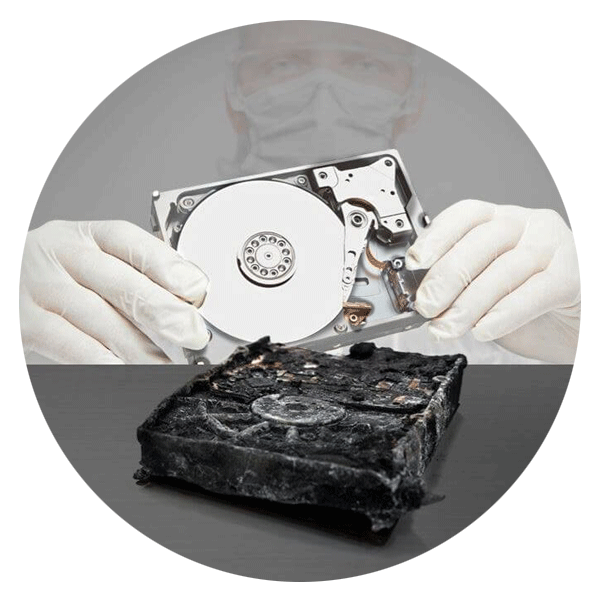Camcorder vs. iPad - which is safer for your data?
Data recovery of pictures, video and music is becoming more common with the advancement of technology. More personal files are being stored on laptops, tablets, cell phones and other highly portable devices. With my experience in the data recovery industry, I know that no one is immune to data loss. Not even me. When technology decisions arise in my household, I'm not only thinking about the products I purchase, but how can I protect the data on them. Join me in the great camcorder vs. iPad debate.
Capturing Memories
Sometime this August, my wife and I will welcome our first baby. And thus starts the economics 101 debate of needs vs. wants. I’m no expert when it comes to baby items of course, which is why I generally believe anything my wife feels is an absolute necessity. The one thing we do both agree on is that we want to capture every single moment through pictures and video. As kids of the 80’s, we both felt that there weren’t enough pictures or video to do us justice. I think this notion comes from the idea that creating any sort of digital content is so easy these days. In fact, not only is it easy to create the content, but it’s almost as easy to share it with friends and family… but more on that later.
Hot Debate - HD Camcorder vs. iPad
So, here’s the predicament. My wife wants us to invest in a top of the line HD camcorder with all of today’s hot features. We’re talking high definition HD 1080P, image stabilization, incredible zoom and HDMI. My take? We don’t need any of that, as I own both an iPhone and iPad. My rationale is simple: “moments” are sporadic, and the one item you are most likely to be carrying around with you when they occur is your smartphone. I feel technology is fast becoming all about portability, usability and shareability. The camcorder (even with all the innovations) seems like a dinosaur in comparison. Steven Spielberg may have a contrasting view to that, but I’m not setting out to direct a movie. Then, my wife asked the question that really put the debate into perspective “Where are we going to store all these videos?” The technology geek in me was already ringing bells like YouTube, Flickr, Vimeo, etc., but the validity of the question didn’t escape me either.
What about Data Loss?
Being part of a data recovery organization of course gives you more food for thought. What would happen if I were to ever damage my phone or iPad? Would my data be lost forever? I’ve seen far too many instances of folks coming to Ontrack with all types of scenarios that lead to loss of videos, pictures, contacts and other relevant information. We’re creating this data so easily these days that very few of us think of a scenario where it could all be lost at the same time. And, of course, how many of us are truly backing up these data? Ontrack’s recent survey revealed a startling fact: while over 60% of users today are backing up, they still experience data loss. I’ve always viewed data loss as being a situation you inadvertently create for yourself. If you’re not backing up your data, guess what? If you’re treating your storage as a default single-point-of-failure, guess what? For myself, it is clear that in addition to uploading my videos to the many hosting services that exist, you can bet that I will also be backing up my videos to an external hard drive.
Protect your Data
A protective layer over protection never hurt anyone, and if my device ever fails me, I want to know that I have multiple access points to retrieve it. Smartphones and tablets give me the ability to quickly upload these videos to a secure hosting location. Sure these very same hosting locations can fail or go out of business someday, but I will always have my hard drives to turn to in that scenario. When you compare all of this to a camcorder, you realize that a camcorder requires you to manually upload your pictures and video unless you invest in a wireless option.
The debate of course will rage on, but knowing what I know about data recovery, I want to invest in technology that gives me the best possible scenario to recover that data when it fails (because it will). Shouldn’t we let the safety of the data decide?

Call for Immediate Assistance!
- Crypto Currency (2)
- Data Backup (9)
- Data Erasure (8)
- Data Loss (15)
- Data Protection (11)
- Data Recovery (22)
- Data Recovery Software (2)
- Data Security (3)
- Data Storage (15)
- Degaussing (1)
- Deleted Data (5)
- Digital Photo (2)
- Disaster Recovery (6)
- Encryption (1)
- Expert Articles (5)
- Hard Drive (7)
- Laptop/Desktop (7)
- Memory Card (5)
- Mobile Device (13)
- Ontrack PowerControls (1)
- Raid (5)
- Ransomware & Cyber Incident Response (6)
- Server (6)
- SSD (14)
- Tape (17)
- Virtual Environment (9)
